- Home
- Elmore Leonard
Last Stand at Saber River Page 10
Last Stand at Saber River Read online
Page 10
“The feeling is a kind of knowledge itself.”
“But it isn’t something you can prove, is it?” Martha stood with her hands motionless in the dishwater, her full attention on Luz. “What if suddenly you realize that all you’ve said couldn’t possibly be true, that it’s all something out of a dream or—”
“Listen, I did dream about him! A number of times before, then again last night.” The girl’s eyes went to the main room and back again.
“I saw an animal in the dream, like a small wolf or a coyote, and it was slinking along in the moonlight. Then, in front of it, there was a chicken. The chicken was feeding on the ground and before it could raise its head, the animal was on it and tearing it apart with its teeth and eating it even while the chicken was still alive. I watched, cold with fear, but unable to move. And as I watched, the animal began to change.
“It was still on its haunches facing me, still eating and smeared with the blood of the chicken. First its hind legs became human legs; then its body became the clothed body of a man. Then the face began to change, the jaw and the nose and the chin. The teeth were still those of an animal and he had no forehead and his eyes and head were still like an animal’s. He was looking at me with blood on his mouth and on his hand…on the one hand that he had. And at that moment I ran from him screaming. I knew it was the face of Mr. Janroe.”
“Luz, you admit it’s a dream—”
“Listen, that isn’t all of it.” Luz glanced toward the main room again. “I awoke in a sweat and with a thirst burning the inside of my throat. So I left my bed and went down for a drink of water. The big room was dark, but at once I saw that a lamp was burning in here. I came to the door, I looked into this room, and I swear on my mother’s grave that my heart stopped beating when I saw him.”
“Mr. Janroe?”
Luz nodded quickly. “He was sitting at the table holding a piece of meat almost to his mouth and his eyes were on me, not as if he’d looked up as I appeared, but as if he’d been watching me for some time. I saw his eyes and the hand holding the meat, just as in the dream, and I ran. I don’t know if I screamed, but I remember wanting to scream and running up the stairs and locking my door.”
Martha dried her hands on her apron. She smiled at Luz gently and put her hand on the girl’s arm.
“Luz, there isn’t anything supernatural about a man eating with his fingers.”
“You didn’t see him.” Luz stopped. Her eyes were on the doorway again and a moment later Janroe appeared. Martha glanced at him, then at Luz again as the girl suddenly turned and pushed through the screen door.
Janroe came into the kitchen. He was holding his hat and wearing a coat, but the coat was open and Martha noticed the butt of a Colt beneath one lapel in a shoulder holster. Another Colt was on his hip.
“Did I interrupt something?”
“Nothing important.” Martha turned from the sink to face him. “You’re going out?”
“I thought I would.” He watched her with an expression of faint amusement. “Wondering if I’m going to see your husband?”
“Yes, I was.”
“I might see him.”
“If you’re going that way, would you mind stopping by the house?”
“Why?”
“Why do you think, Mr. Janroe?”
“Maybe he’s not so anxious to let you know what he’s doing.”
Now a new side of him, Martha thought wearily. She said nothing.
“I mean, considering how he dropped you here and ran off so quick.” Janroe hooked his hat on the back of the nearest chair. Unhurriedly he started around the table, saying now, “A man is away from his wife for two years or more, then soon as he gets home he leaves her again. What kind of business is that?”
Martha watched him still coming toward her. “We know the reason, Mr. Janroe.”
“The reason he gives. Worried about his wife and kids.”
“What other reason is there?”
“It wouldn’t be my business to know.”
“You seem to be making it your business.”
“I was just wondering if you believed him.”
He was close to her now. Martha stood unmoving, feeling the wooden sink against her back. “I believe him,” she said calmly. “I believe anything he tells me.”
“Did he tell you he led a saintly life the years he was away?”
“I never questioned him about it.”
“Want me to tell you what a man does when he’s away from home?”
“And even if I said no—”
“They have a time for themselves,” Janroe went on. “They carry on like young bucks with the first smell of spring. Though they expect their wives to sit home and be as good as gold.”
“You know this from experience?”
“I’ve seen them.” His voice was low and confiding. “Some of them come home with the habit of their wild ways still inside them, and they go wandering off again.”
He watched her closely, his head lowered and within inches of hers. “Then there’s some women who aren’t fooled by it and they say, ‘If he can fool around and have a time, then so can I.’ Those women do it, too. They start having a time for themselves and it serves their husbands right.”
Martha did not move. She was looking at him, at his heavy mustache and the hard, bony angles of his face, feeling the almost oppressive nearness of him. She said nothing.
Janroe asked, almost a whisper, “You know what I mean?”
“If I were to tell my husband what you just said,” Martha answered quietly, “I honestly believe he would kill you.”
Janroe’s expression did not change. “I don’t think so. Your husband needs me. He needs a place for you and the kids to stay.”
“Are you telling me that I’m part of the agreement between you and my husband?”
“Well now, nothing so blunt as all that.” Janroe smiled. “We’re white men.”
“We’ll be out of here within an hour,” Martha said coldly.
“Now wait a minute. You don’t kid very well, do you?”
“Not about that.”
He backed away from her, reaching for his hat. “I don’t even think you know what I was talking about.”
“Let’s say that I didn’t,” Martha said. “For your sake.”
Janroe shrugged. “You think whatever you want.” He put his hat on and walked out. In front of the store, he mounted a saddled buckskin and rode off.
He could still see the calm expression of Martha Cable’s face as he forded the shallow river, as he kicked the buckskin up the bank and started across the meadow that rolled gradually up into the pines that covered the crest of the slope. Then he was spurring, running the buckskin, crossing the sweep of meadow, in the open sunlight now with the hot breeze hissing past his face. But even then Martha was before him.
She stared at him coldly. And the harder he ran—holding the reins short to keep the buckskin climbing, feeling the brute strength of the horse’s response, hearing the hoofs and the wind and trying to be aware of nothing else—the more he was aware of Martha’s contempt for him.
Some time later, following the trail that ribboned through the pines, the irritating feeling that he had made a fool of himself began to subside. It was as if here in the silence, in the soft shadows of the pines, he was hidden from her eyes.
He told himself to forget about her. The incident in the kitchen had been a mistake. He had seen her and started talking and one thing had led to another; not planned, just something suddenly happening that moment. He would have to be more careful. She was an attractive woman and her husband was miles away, but there were matters at hand more important than Martha Cable. She would wait until later, when there were no Kidstons…and no Paul Cable.
Still, telling himself this, her calmness and the indifference grated on his pride and he was sure that she had held him off because of his missing arm, because he was something repulsive to her. Only part of a man.
H
e jerked his mind back to the reason he was here. First, to talk to Cable, to hammer away at him until he consented to go after the Kidstons. Then, to scout around and see what was going on.
The latter had become a habit: riding this ridge trail, then bearing off toward the Kidston place and sometimes approaching within view of the house. He did this every few days and sometimes at night, because if you kept your eyes open you learned things. Like Duane’s habit of sitting on the veranda at night—perhaps every night—for a last cigar. Or Vern visiting his grazes once a week and sometimes not returning until the next morning. But always there had been people around the house while Duane sat and smoked on the veranda; and almost invariably Vern made his inspections with Bill Dancey along. Knowing that Kidston’s riders would be off on a horse gather in a few days was the same kind of useful intelligence to keep in mind. He had already told Cable about the riders being away. Perhaps he would tell him everything—every bit of information he knew about Vern and Duane Kidston. Lay it all out on the table and make it look easy.
High on the slope, but now even with Cable’s house, Janroe reined in. There was no sign of life below. No sounds, no movement, no chimney smoke. But Cable could still be home, Janroe decided.
Then, descending the path, keeping his eyes on the shingled roof and the open area of the front yard, he began to think: But what if he isn’t home?
Then you talk to him another time.
No, wait. What if he isn’t home and isn’t even close by?
Reaching the back of the adobe, he sat for a moment, listening thoughtfully to the silence.
And what if something happened to his house while he was away? Janroe began to feel the excitement of it building inside of him.
But be careful, he thought.
He rode around to the front and called Cable’s name.
No answer.
He waited; called again, but still the house stood silent and showed no signs of life.
Janroe reined the buckskin around and crossed the yard to the willows. His gaze went to the horse herd out on the meadow and he studied the herd for some moments. No, Cable wasn’t there. No one was.
He was about to turn back to the house, but he hesitated. No one anywhere. What does that say?
No, it’s too good. When a thing looks too good there’s something wrong with it. Still, he knew that all at once he was looking at an almost foolproof way to jab Cable into action. He sat motionless, looking at the horse herd, making sure no riders were out beyond the farthest grazing horses, and thinking it all over carefully.
Would he be suspected? No. He’d tell Martha and Luz he went to Fort Buchanan on business and no one was home when he passed here. He could even head up toward Buchanan, spend the night on the trail and double back to the store in the morning.
But what if someone came while he was in the house? What if Cable came home?
You either do it or you don’t do it, but you don’t think about it any more!
It was decided then. He returned to the adobe, swung down as he reached the ramada, and pushed open the front door.
Inside, in the dim closeness of the room, an urgency came over him and he told himself to hurry, to get it over with and get out.
From the stove he picked up a frying pan, went to the kitchen cupboards, opened them and swung the pan repeatedly into the shelves of dishes until not a cup or a plate remained in one piece. With a chair he smashed down the stove’s chimney flue. A cloud of soot puffed out and filtered through the room as he dragged the comforter and blankets from the bed. He emptied the kitchen drawers then, turning them upside down; found a carving knife and used it to slash open the mattress and pillows still on the bed.
Enough?
He was breathing heavily from the exertion, from the violence of what had taken him no more than a minute. Hesitating now, his eyes going over the room, he again felt the urgent need to be out of here.
Enough.
He went out brushing soot from his coat, mounted and rode directly across the yard and forded the river. He stopped long enough to convince himself that no riders had joined the Kidston herd since his last look at it. Then he rode on, spurring across the meadow now, pointing for the east slope and not until he was in the piñon, beginning the steep climb up through the trees, did he look back and across to Cable’s house. Not until then did he take the deep breath he had wanted to take in the house to make himself relax.
You’ve pushed him now, Janroe told himself, hearing the words calmly, but still feeling the excitement, the tension, tight through his body.
You just busted everything wide open.
It was evening, but not yet dark, a silent time with the trees standing black and thick-looking and the sky streaked with red shades of sun reflection. A whole day had passed and Cable was returning home.
He had already skirted the store, wanting to see Martha but wanting more to avoid Janroe, and now he was high up in the shadows and the silence of the pines, following the horse trail along the ridge.
He would talk to Janroe another time, after he had thought this out and was sure he knew what to say to him.
This morning he had talked to a man, a small old man who was perhaps in his sixties with a graying beard and a mustache that was tobacco-stained yellow about his mouth. Denaman’s friend from Hidalgo. In the dimness of the adobe room, and with the early morning sounds of the village outside, the man seemed too old or too small or too fragile to do whatever he was doing.
But he asked Manuel Acaso questions about Cable, then looked at Cable and asked more questions; and it was his eyes that convinced Cable that the man was not too old or too thin or too frail. Brown eyes—Cable would remember them—that were gentle and perhaps kind; but they were not smiling eyes. They were the eyes of a patient, soft-spoken man who would show little more than mild interest at anything he saw or heard.
He was willing enough to talk about Janroe once he was sure of Cable, and he made no attempt to hide facts or try to justify Janroe’s actions. He spoke slowly, carefully, as if he had memorized the things he was saying….
Edward Janroe, Cable learned, was a native of Florida, born in St. Augustine a few years before the outbreak of the second Seminole war, and had lived there most of his early life. Almost nothing was known of Janroe during this period; not until he joined the army in 1854. From then on his life was on record.
In 1858, a sergeant by this time, Janroe was court-martialed for knifing a fellow soldier in a tavern fight. The man died and Janroe was sentenced to six years of hard labor at the Fort Marion military prison. He was well into his third year of it when the war broke out. It saved him from completing his sentence.
With a volunteer company from St. Augustine, Janroe traveled to Winchester, Virginia—this during the summer of 1861—and was assigned to the 10th Virginia Infantry, part of General Edmund Kirby Smith’s forces. Strangely enough, despite his prison record, but undoubtedly because of his experience, Janroe was commissioned a full lieutenant of infantry.
A year later, and now a captain, Janroe lost his arm at the battle of Richmond, Kentucky. He was sent to the army hospital at Knoxville, spent seven months there, and was discharged sometime in March, 1863.
But Janroe didn’t go home. He learned that Kirby Smith had been made commander of the Trans-Mississippi Department, headquartered at Shreveport, Louisiana, and that’s where Janroe went. In the early part of April he was reinstated with the rank of lieutenant and served under Dick Taylor, one of Kirby Smith’s field generals.
Up to this point Cable had listened in silence.
“He didn’t tell me that.”
“I don’t care what he told you,” the bearded man said. “He served under Taylor in the fighting around Alexandria and Opelousas.”
But not for long. He was with Taylor less than two months when he was discharged for good. He was told that he had given enough of himself and deserved retirement. The real reason: his wild disregard for the safety of his men, throwing
them into almost suicidal charges whenever he made contact with the enemy. This, and the fact that he refused to take a prisoner. During his time with Taylor, Janroe was responsible for having some one hundred and twenty Union prisoners lined up and shot.
Janroe pleaded his case all the way to Kirby Smith’s general staff—he was a soldier and soldiering was his life; but as far as every one of them was concerned, Janroe was unfit for active duty and immediately relieved of his command.
Janroe returned to St. Augustine, then in the hands of Federal forces. Through a man he had known there before, he made contact with Confederate Intelligence agents and went to work for them. And eventually—in fact after well over a year in Florida—he was sent to Mexico. There he was given his present assignment.
“I can see why he didn’t tell me everything,” Cable said.
The bearded man nodded. “Naturally.”
Cable watched him. “What do you think of Janroe?”
“He’s a hard man to know.”
“But what do you think?”
“I don’t care for his kind, if that’s what you mean.”
“Yet you have him working for you.”
“Mr. Cable,” the bearded man said, “Janroe seems to have one aim in life. To see the South win the war.”
“Or to see more Yankees killed.”
“What’s the difference?”
“You know what I mean.”
“I know he’s moved over two thousand rifles through the store since coming here,” the bearded man said.
“And now he wants to kill two men who aren’t even in the war.”
“Well, I wonder if you can blame him,” the bearded man said, somewhat wearily now. “A man is sent to war and taught how to kill; but after, the unlearning of it is left up to him.”
“Except that Janroe knew how to kill before he went to war,” Cable said.
So you’ll wait, Cable thought now, and wonder about Janroe and wonder when Vern will make his move, while you try to stay calm and keep yourself from running away.
He was perhaps a mile from his house, passing through a clearing in the pines, when he saw the two riders down in the meadow, saw them for one brief moment before they entered the willows at the river.

 Charlie Martz and Other Stories: The Unpublished Stories
Charlie Martz and Other Stories: The Unpublished Stories Elmore Leonard's Western Roundup #2
Elmore Leonard's Western Roundup #2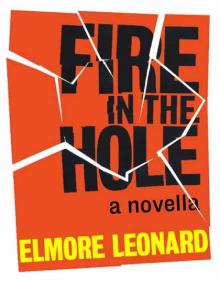 Fire in the Hole
Fire in the Hole Tishomingo Blues (2002)
Tishomingo Blues (2002)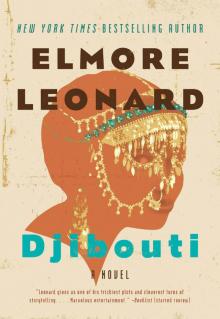 Djibouti
Djibouti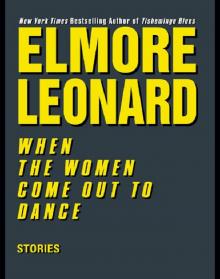 When the Women Come Out to Dance: Stories
When the Women Come Out to Dance: Stories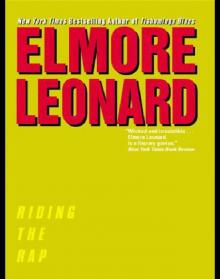 Riding the Rap
Riding the Rap Moment of Vengeance and Other Stories
Moment of Vengeance and Other Stories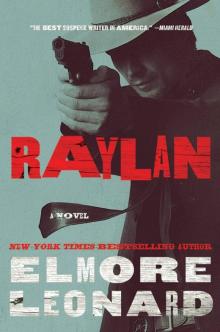 Raylan
Raylan Touch
Touch Mr Majestyk
Mr Majestyk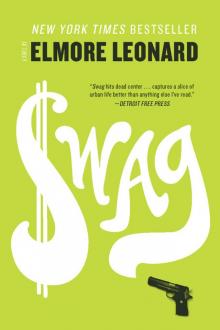 Swag
Swag Road Dogs
Road Dogs La Brava
La Brava The Hot Kid
The Hot Kid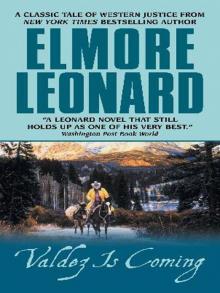 Valdez Is Coming: A Novel
Valdez Is Coming: A Novel Be Cool
Be Cool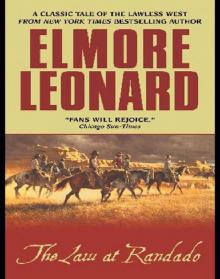 The Law at Randado
The Law at Randado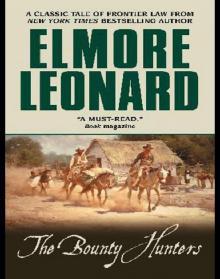 The Bounty Hunters
The Bounty Hunters When the Women Come Out to Dance
When the Women Come Out to Dance 310 to Yuma and Other Stories (1953)
310 to Yuma and Other Stories (1953)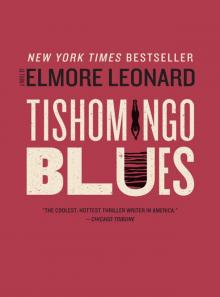 Tishomingo Blues
Tishomingo Blues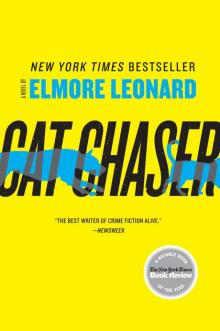 Cat Chaser
Cat Chaser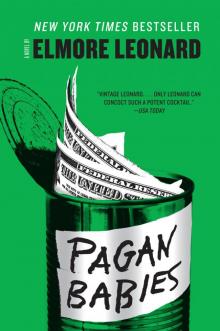 Pagan Babies
Pagan Babies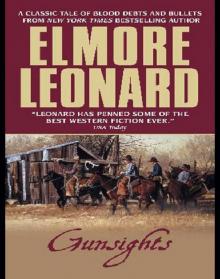 Elmore Leonard's Western Roundup #1
Elmore Leonard's Western Roundup #1 52 Pickup
52 Pickup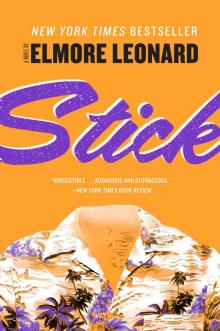 Stick
Stick The Moonshine War
The Moonshine War Valdez Is Coming
Valdez Is Coming City Primeval
City Primeval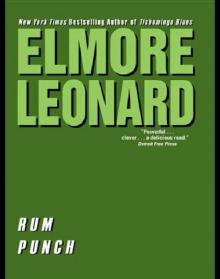 Rum Punch
Rum Punch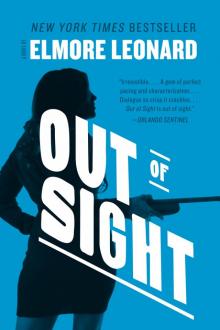 Out of Sight
Out of Sight Naked Came the Manatee (1996)
Naked Came the Manatee (1996)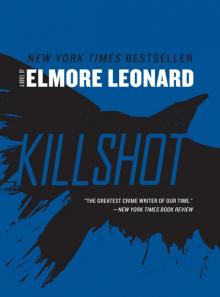 Killshot
Killshot Cuba Libre
Cuba Libre Forty Lashes Less One
Forty Lashes Less One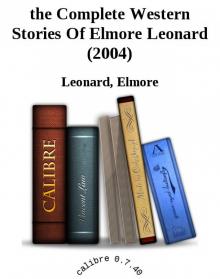 The Complete Western Stories of Elmore Leonard
The Complete Western Stories of Elmore Leonard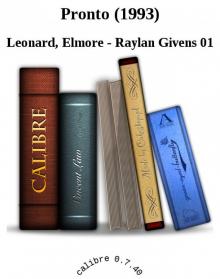 Pronto
Pronto Split Images
Split Images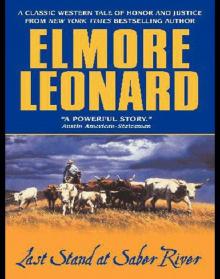 Last Stand at Saber River
Last Stand at Saber River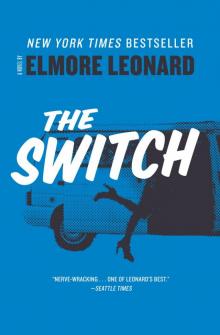 The Switch
The Switch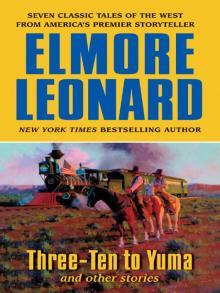 Three-Ten to Yuma and Other Stories
Three-Ten to Yuma and Other Stories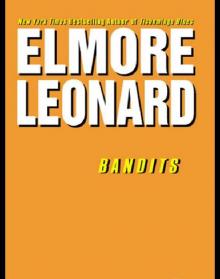 Bandits
Bandits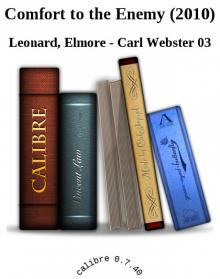 Comfort to the Enemy and Other Carl Webster Stories
Comfort to the Enemy and Other Carl Webster Stories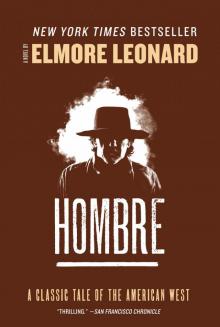 Hombre
Hombre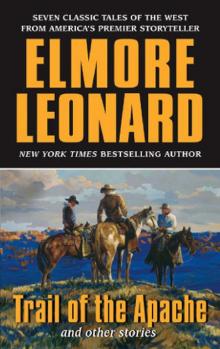 Trail of the Apache and Other Stories
Trail of the Apache and Other Stories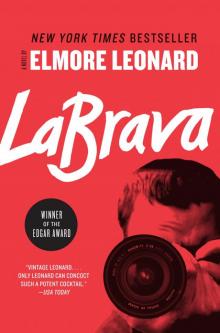 LaBrava
LaBrava Gold Coast
Gold Coast Jackie Brown
Jackie Brown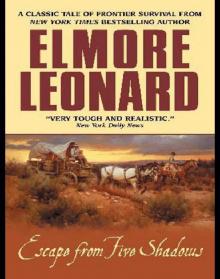 Escape From Five Shadows
Escape From Five Shadows Karen Makes out (1996)
Karen Makes out (1996)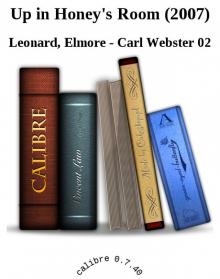 Up in Honey's Room
Up in Honey's Room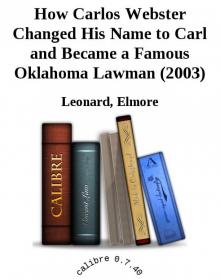 How Carlos Webster Changed His Name to Carl and Became a Famous Oklahoma Lawman (2003)
How Carlos Webster Changed His Name to Carl and Became a Famous Oklahoma Lawman (2003)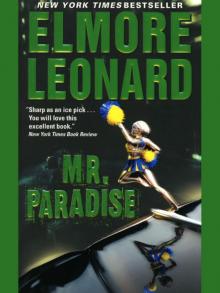 Mr. Paradise
Mr. Paradise The Hunted
The Hunted Freaky Deaky
Freaky Deaky Louly and Pretty Boy (Ss)
Louly and Pretty Boy (Ss)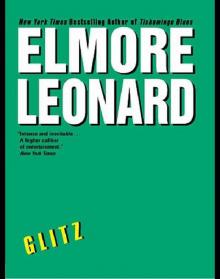 Glitz
Glitz A Coyote's in the House
A Coyote's in the House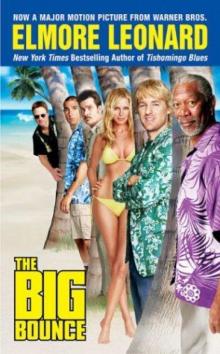 The Big Bounce jr-1
The Big Bounce jr-1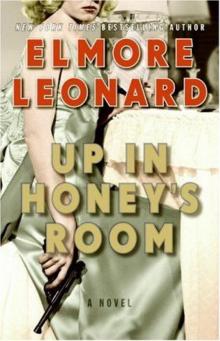 Up in Honey's Room cw-2
Up in Honey's Room cw-2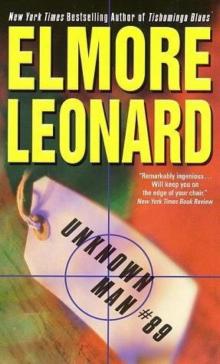 Unknown Man #89 jr-3
Unknown Man #89 jr-3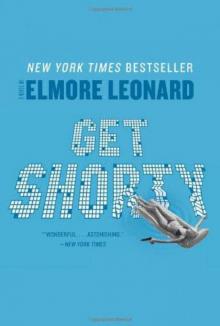 Get Shorty: A Novel cp-1
Get Shorty: A Novel cp-1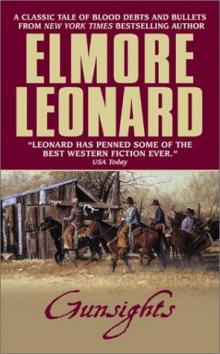 Gunsights
Gunsights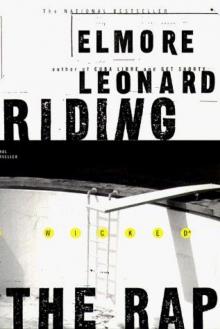 Riding the Rap rg-2
Riding the Rap rg-2